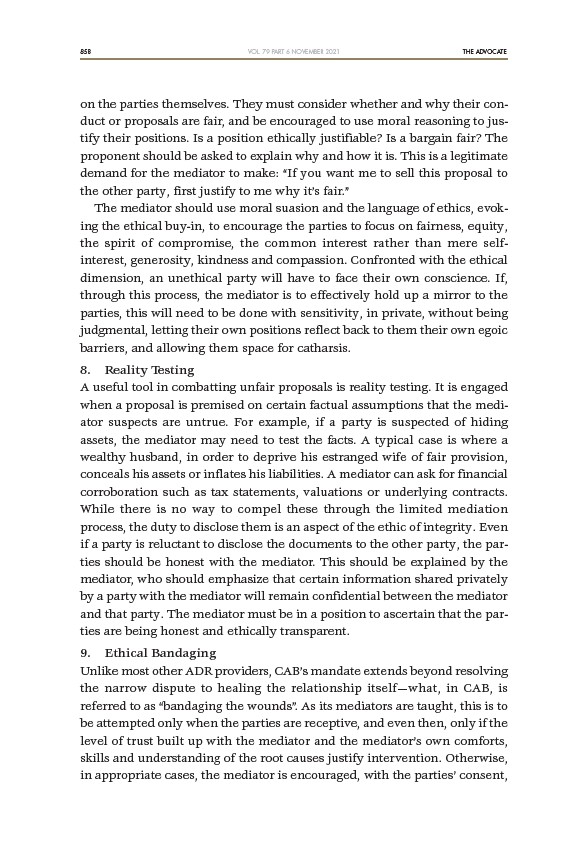
858 THE ADVOCATE
VOL. 79 PART 6 NOVEMBER 2021
on the parties themselves. They must consider whether and why their conduct
or proposals are fair, and be encouraged to use moral reasoning to justify
their positions. Is a position ethically justifiable? Is a bargain fair? The
proponent should be asked to explain why and how it is. This is a legitimate
demand for the mediator to make: “If you want me to sell this proposal to
the other party, first justify to me why it’s fair.”
The mediator should use moral suasion and the language of ethics, evoking
the ethical buy-in, to encourage the parties to focus on fairness, equity,
the spirit of compromise, the common interest rather than mere self-
interest, generosity, kindness and compassion. Confronted with the ethical
dimension, an unethical party will have to face their own conscience. If,
through this process, the mediator is to effectively hold up a mirror to the
parties, this will need to be done with sensitivity, in private, without being
judgmental, letting their own positions reflect back to them their own egoic
barriers, and allowing them space for catharsis.
8. Reality Testing
A useful tool in combatting unfair proposals is reality testing. It is engaged
when a proposal is premised on certain factual assumptions that the mediator
suspects are untrue. For example, if a party is suspected of hiding
assets, the mediator may need to test the facts. A typical case is where a
wealthy husband, in order to deprive his estranged wife of fair provision,
conceals his assets or inflates his liabilities. A mediator can ask for financial
corroboration such as tax statements, valuations or underlying contracts.
While there is no way to compel these through the limited mediation
process, the duty to disclose them is an aspect of the ethic of integrity. Even
if a party is reluctant to disclose the documents to the other party, the parties
should be honest with the mediator. This should be explained by the
mediator, who should emphasize that certain information shared privately
by a party with the mediator will remain confidential between the mediator
and that party. The mediator must be in a position to ascertain that the parties
are being honest and ethically transparent.
9. Ethical Bandaging
Unlike most other ADR providers, CAB’s mandate extends beyond resolving
the narrow dispute to healing the relationship itself—what, in CAB, is
referred to as “bandaging the wounds”. As its mediators are taught, this is to
be attempted only when the parties are receptive, and even then, only if the
level of trust built up with the mediator and the mediator’s own comforts,
skills and understanding of the root causes justify intervention. Otherwise,
in appropriate cases, the mediator is encouraged, with the parties’ consent,